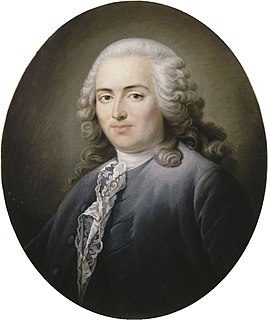A Quote by Tilopa
No thought, no reflection, no analysis, no cultivation, no intention; let it settle itself.
Quote Topics
Related Quotes
The naive which is simultaneously beautiful, poetic, and idealistic, must be both intention and instinct. The essence of intention, in this sense, is freedom. Consciousness is far from intention. There is a certain enamoured contemplation of one's own naturalness or silliness which itself is unspeakably silly. Intention does not necessarily require a profound calculation or plan.
In fact we say that an intention is good, that is, right in itself, but that an action does not bear any good in itself but proceeds from a good intention. Whence when the same thing is done by the same man at different times, by the diversity of his intention, however, his action is now said to be good, now bad.
Every time we have a thought that's not a thought of kindness towards others - then we've left the field of intention and, therefore, lost the power of the field of intention, as well. The whole idea is to connect yourself back to this field from which all things emanate, to return to your source and watch it in every thought that you have.
Thus we can get the correct answer for the probability of partial reflection by imagining (falsely) that all reflection comes from only the front and back surfaces. In this intuitively easy analysis, the 'front surface' and 'back surface' arrows are mathematical constructions that give us the right answer, whereas .... a more accurate representation of what is really going on: partial reflection is the scattering of light by electrons inside the glass.
The earth has been cultivated before it has been divided; the cultivation itself having been the only motive for a division, and for that law which secures to every one his property. For the first persons who have employed themselves in cultivation, have probably worked as much land as their strength would permit, and, consequently, more than was necessary for their own nourishment.
Desperation precludes reflection. That is one of the reasons why smart people can get involved in very obviously unworkable relationships. Like addiction, that deep, Imago attachment is more powerful than logic, and in fact disables logic. So, any explanation or analysis or reflection on such a feeling is already many steps removed from the experience.
Philosophy, like science, consists of theories or insights arrived at as a result of systemic reflection or reasoning in regard to the data of experience. It involves, therefore, the analysis of experience and the synthesis of the results of analysis into a comprehensive or unitary conception. Philosophy seeks a totality and harmony of reasoned insight into the nature and meaning of all the principal aspects of reality.
































